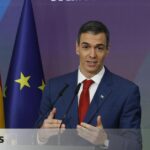
While proclaiming himself a peacemaker, Trump alternates between prestige negotiations and arbitrary military actions, leaving the world at the mercy of his will
A year has passed since Donald Trump’s re-election, and the landscape of global diplomacy is unrecognizable. Washington, once synonymous with predictability — even the tense predictability of the Cold War or the so-called “War on Terror” — is today transformed into a territory dominated by the whim of a single man. Personalism has become the central axis of American foreign policy, with consequences that reverberate from historical allies to declared rivals.
As one White House veteran described it: “One year after his re-election, diplomacy is being driven by the president’s personal whims to a point unprecedented in the modern era.” For the world, the lesson is clear and brutal: the only foreign policy that matters is the one that feeds the ego of the occupant of the Oval Office.
Global flattery
The logic of “pleasing to survive” has become an international rule. This week, Japan’s Prime Minister, Sanae Takaichi, arrived in Washington carrying an unusual declaration: she nominated Donald Trump for the Nobel Peace Prize. The gesture is not isolated; The governments of Cambodia, Pakistan and Israel are also keen to flatter the president in the hope of avoiding reprisals.
In the United Kingdom, Prime Minister Sir Keir Starmer used his initial meeting with Trump to announce an invitation for a second state visit. The gesture was praised as “truly historic” and “unprecedented”, highlighting the climate of submission that now permeates transatlantic relations. Diplomatic sources, speaking anonymously, describe this flattery as “undignified”, but for allies and partners, it has become almost a painful obligation.
And those who don’t bend? The punishment is immediate and severe. The relationship between the United States and India, once on a strategic rise, plummeted after Narendra Modi refused to publicly credit Trump for the ceasefire between India and Pakistan. The American response was harsh: 50% tariffs on Indian products. Canada, another historic ally, also felt the strength of the presidential ego: Ontario’s criticism of the tariffs triggered tariff retaliation, showing that national sovereignty had become an irrelevant detail in the face of Trump’s fury.
The chaos method
Despite the apparent chaos, some constants emerge clearly. Trump is obsessed with customs tariffs, convinced that they will enrich and strengthen the United States. He believes that his allies have historically exploited the country, and this victim narrative justifies the predatory “America First” policy.
The old talk about American values and freedom — dear to previous presidents, even if hypocritical — was abandoned. Now, Trump focuses exclusively on strength and victories, understood as billion-dollar investments, trade agreements and peace treaties that he can personally claim.
Irony or ambition? Insider sources suggest that the desire to be recognized as a peacemaker may reflect a genuine horror of war. But others see in the search for the Nobel Peace Prize a desperate desire to match Barack Obama in international prestige. The president himself even considered: “I’m hearing I’m not doing well. I’m really at the bottom of the pyramid.”
As the White House highlights its role in ceasefires in Gaza and agreements between Thailand and Cambodia, the mask of peacemaker quickly falls away. Trump authorized air strikes against Iran, claiming merit for the actions, and simultaneously sent the aircraft carrier USS Gerald R. Ford to the Caribbean, threatening possible intervention in Venezuela. Classic imperialism returns to the Americas, without disguise.
Tariffs are a pressure weapon
In the Global South, tariffs are the daily routine of Trumpist oppression. After the so-called “liberation day” on April 2, with global increases, tariff policy became selective and opaque: United Kingdom (10%), Japan and European Union (15%), Philippines (19%), South Africa (30%). For China, threatened with tariffs of up to 100%, the personal meeting between Trump and Xi in Seoul resulted in an average reduction to 45% — a “discount” decided by shaking hands.
Trump’s personal quest for a “grand bargain” with Xi Jinping has disrupted the only area with some consensus in Washington: containing China as a major emerging power. The same tariffs imposed on allies in Asia — Japan, India, Taiwan and South Korea — directly contradict coalition efforts against Beijing. The result is a geopolitical disaster: countries fearing American instability are now seeking rapprochement with China.
Analysts suggest that Trump does not have a coherent doctrine. However, within his administration, three groups compete for influence:
- The Primacists: Traditional imperialists who defend the US global role and interventionism on all continents, led by Marco Rubio and Lindsey Graham.
- The Moderators (Restrainers): Isolationists skeptical about allies, represented by JD Vance, seeking to avoid unprofitable wars.
- The Prioritizers (“Asia First”): They propose abandoning secondary fronts and concentrating efforts on containing China, with figures like Elbridge Colby.
While these tribes fight in Washington, the real world—from Gaza to the Caribbean, from Indian factories to the Philippines—bears the consequences. One year after his re-election, the “Trump Doctrine” is simply the doctrine of chaosand its maxim is unequivocal: “don’t trust America.”
Read also: Tariffs and vanity dominate Washington
A year after Donald Trump’s re-election, American foreign policy has turned into a theater of improvisation, where strategic decisions depend more on the president’s mood and personal whims than on any rational analysis of global power. As Jeremy Shapiro, co-author of a study on the Trump administration, summarized: “The president doesn’t care about any of these schools of thought. He is driven by his own personal and psychological interests.”
The result is an environment in which three factions of the American far right—isolationists, primacists, and prioritisers—desperately vie for presidential attention, aligning their ambitions with the president’s thirst for short-term victories and immediate publicity. Each group experienced both triumphs and humiliations throughout the first year of the second term.
The moderating group, led by Vice President JD Vance, pursued a pragmatic and cynical policy, including rapprochement with Vladimir Putin’s Russia and reducing American aid to Ukraine. In February, Vance played a central role in the historic episode of the total cut in aid to Ukraine, forcing the Europeans to cover the financial deficit. He also supported pressure on NATO for member countries to increase their defense spending.
However, the big bet on rapprochement with Putin failed. The summit in Alaska in August disappointed Trump, who began to demonstrate a friendlier stance with Zelensky and even tightened sanctions against Moscow. In the Middle East, the decision to bomb Iran provoked internal division, with influential MAGA figures such as Tucker Carlson and Marjorie Taylor Greene publicly criticizing the move. Vance, in an internal chat, did not hide his frustration: “I think we’re making a mistake. I hate to have to bail out Europe again.”
For primacists such as Marco Rubio and Lindsey Graham, action against Iran was celebrated, but Trump’s decision to end the campaign abruptly disappointed the faction. Now, Rubio focuses on Venezuela, promoting an aggressive policy against Maduro, aligning the issue with Trump’s domestic concerns, such as drugs and immigration, in the hope of achieving another “televisionable” victory.
Despite internal differences, this faction managed to keep Trump in NATO, ensuring that European allies increased spending, a commitment that balances tensions between isolationists and primacists.
The “Asia First” group, led by Elbridge Colby, had its weakest performance. The goal of reducing European and Middle Eastern focus on containing China faces resistance. Rumors indicate that the Pentagon is reviewing its strategy, prioritizing the Western Hemisphere, which weakens Colby’s vision. Any personal agreement between Trump and Xi that harms Taiwan would represent a final blow to the influence of this group and the primacists.
Personal imperialism
Trump himself often ignores all tribes and their strategic goals. The attempt to annex Greenland or suggest that Canada become the 51st state reveals a personal, chaotic and unpredictable imperialist impulse. Even Rubio’s primacists considered these ideas extreme, and now discreet efforts seek to minimize such initiatives. However, the combination of insults to allies, arbitrary tariffs and encouragement of the European far right will have long-term consequences.
The Trump machine guarantees visible “victories” — ceasefires, strengthened NATO and favorable trade deals — but Shapiro warns: “Trump is trading short-term victories for long-term problems. He is wasting 80 years of American diplomatic capital.”
This capital has been built over decades, sustaining the global trading system and ensuring security for strategic allies, consolidating American influence in Japan, the United Kingdom, Canada and beyond. Today, Trump’s willingness to use that influence arbitrarily sends a devastating message: trusting America has become risky.
The reaction of countries outside the direct US orbit is even more assertive. In Brazil, President Luiz Inácio Lula da Silva firmly criticized Washington’s attempts to interfere in internal processes involving Bolsonaro. In India, Modi has ignored calls from Trump following the tariff dispute.
As a recent article from Foreign Affairsthe US is alienating undecided allies, while blocs like the BRICS gain anti-American cohesion. Trump demonstrates the residual power of the US, but simultaneously paves the way for a future in which the country will have less capacity for global influence.
At the end of the first year of the second term, the “Trump Doctrine” becomes increasingly clear: the world lives under the chaos of American personalismwhere the maxim that governs foreign policy is simple and implacable — “don’t trust America.”
With information from Financial Times*
Source: https://www.ocafezinho.com/2025/11/02/diplomacia-a-merce-de-um-unico-homem/

